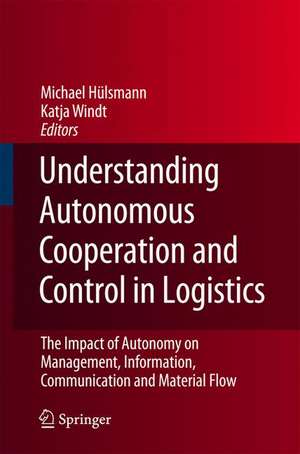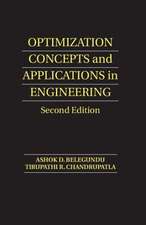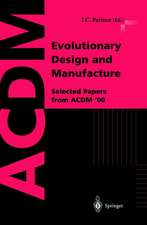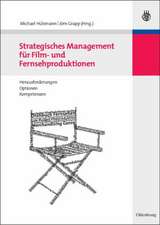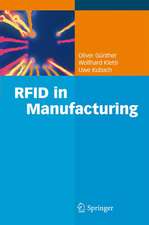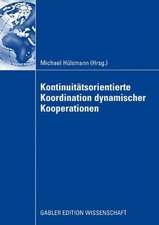Understanding Autonomous Cooperation and Control in Logistics: The Impact of Autonomy on Management, Information, Communication and Material Flow
Editat de Michael Hülsmann, Katja Windten Limba Engleză Hardback – 8 iun 2007
In this context several fundamental questions concerning autonomous cooperating logistics processes were investigated:
The identification problem: What are autonomous logistics processes and how do they differ from conventionally managed processes?
The description problem: Which changes will autonomy cause in order processing?
One of the first results is a definition for the term autonomy for applications in engineering science. The constituent characteristics of this definition were considered within the development of the catalogue of criteria in order to describe autonomous logistic processes. Regarding the modelling of autonomous processes, first requirements for modelling methods were specified. To validate the research results, a production-logistic shop-floor scenario and a practical scenario based on the real business processes of an automobile terminal were developed. Simulation studies concerning autonomously controlled allocation of parking areas document comprehensive opportunities for improvement.
| Toate formatele și edițiile | Preț | Express |
|---|---|---|
| Paperback (1) | 951.59 lei 6-8 săpt. | |
| Springer Berlin, Heidelberg – 14 oct 2010 | 951.59 lei 6-8 săpt. | |
| Hardback (1) | 957.75 lei 6-8 săpt. | |
| Springer Berlin, Heidelberg – 8 iun 2007 | 957.75 lei 6-8 săpt. |
Preț: 957.75 lei
Preț vechi: 1167.99 lei
-18% Nou
Puncte Express: 1437
Preț estimativ în valută:
183.27€ • 195.97$ • 152.80£
183.27€ • 195.97$ • 152.80£
Carte tipărită la comandă
Livrare economică 18 aprilie-02 mai
Preluare comenzi: 021 569.72.76
Specificații
ISBN-13: 9783540474494
ISBN-10: 3540474498
Pagini: 445
Ilustrații: XXVIII, 417 p.
Dimensiuni: 155 x 235 x 32 mm
Greutate: 0.8 kg
Ediția:2007
Editura: Springer Berlin, Heidelberg
Colecția Springer
Locul publicării:Berlin, Heidelberg, Germany
ISBN-10: 3540474498
Pagini: 445
Ilustrații: XXVIII, 417 p.
Dimensiuni: 155 x 235 x 32 mm
Greutate: 0.8 kg
Ediția:2007
Editura: Springer Berlin, Heidelberg
Colecția Springer
Locul publicării:Berlin, Heidelberg, Germany
Public țintă
ResearchCuprins
Changing Paradigms in Logistics — Understanding the Shift from Conventional Control to Autonomous Cooperation and Control.- Changing Paradigms in Logistics — Understanding the Shift from Conventional Control to Autonomous Cooperation and Control.- Fundamental Basics and Concepts of Autonomous Control and Cooperation.- Perspectives on Initial Ideas and Conceptual Components of Autonomous Cooperation and Control.- Prologue to Autonomous Cooperation — the Idea of Self-Organisation as its Basic Concepts.- Historical Development of the Idea of Self-Organisation in Information and Communication Technology.- Catalogue of Criteria for Autonomous Control in Logistics.- Business Process Modelling of Autonomously Controlled Production Systems.- Strategic Decisions for Autonomous Logistics Systems.- Autonomous Units: Basic Concepts and Semantic Foundation.- Mathematical Models of Autonomous Logistic Processes.- Autonomous Decision Model Adaptation and the Vehicle Routing Problem with Time Windows and Uncertain Demand.- Autonomous Control Methods for the Managment, Information and Communication Layer.- Approaches to Methods of Autonomous Cooperation and Control for the Management-, Information- and Communication-Layer of Logistics.- Self-Organization in Management Science.- Autonomous Cooperation — A Way to Vitalize Organizations?.- Self-Organization Concepts for the Information- and Communication Layer of Autonomous Logistic Processes.- Distributed Knowledge Management in Dynamic Environments.- Proactive Knowledge-Based Risk Management.- Autonomy in Software Systems.- Specifying Adaptive Business Processes within the Production Logistics Domain — A new Modelling Concept and its Challenges.- Autonomous Control Methods and Examples for the Material Flow Layer.- Approachesto Methods of Autonomous Cooperation and Control and Examples for the Material Flow Layer.- Evaluation of Autonomous Logistic Processes — Analysis of the Influence of Structural Complexity.- Autonomous Control by Means of Distributed Routing.- Dynamic Transport Reference Scenarios.- Autonomously Controlled Storage Allocation on an Automobile Terminal.- Intelligent Containers and Sensor Networks Approaches to apply Autonomous Cooperation on Systems with limited Resources.- Transport Scenario for the Intelligent Container.
Notă biografică
Dr.-Ing. Katja Windt is leader of the sub-department "Intelligent Planning and Control Methods for Logistic Systems" within the Bremen Institute of Industrial Technology and Applied Work Sciences (BIBA) at the University of Bremen. She supervises one sub-project ("Process-Orientated Basic Studies for Autonomous Cooperation and Control") of the Collaborative Research Center named "Autonomous Cooperating Logistic Processes – A Paradigm Shift and its Limitations" which is supported by the German Research Foundation. In July 2004 she became member of die Junge Akademie (The Young Academie) in Germany and is elected as speaker of the plenum for a one year period in 2006/2007. In her research she focuses on planning and control methods for production and logistic systems.
Prof. Dr. Michael Hülsmann is head of the unit "Management of Sustainable System Development" and academic director of the SCOUT-Institute for Strategic Competence Management in the Faculty for Business Studies and Economics at the University of Bremen. Additionally, he is member of the board of the Collaborative Research Centre 637 "Autonomous Cooperating Logistic Processes - A Paradigm Shift and its Limitations", which is supported by the German Research Foundation. In his research he focuses on strategic management and organisation theory, especially for logistics.
Prof. Dr. Michael Hülsmann is head of the unit "Management of Sustainable System Development" and academic director of the SCOUT-Institute for Strategic Competence Management in the Faculty for Business Studies and Economics at the University of Bremen. Additionally, he is member of the board of the Collaborative Research Centre 637 "Autonomous Cooperating Logistic Processes - A Paradigm Shift and its Limitations", which is supported by the German Research Foundation. In his research he focuses on strategic management and organisation theory, especially for logistics.
Textul de pe ultima copertă
Autonomous co-operation addresses the control problem of logistic processes characterized by dynamical changing parameters and complex system behaviour. During control procedures erratic, non-predictable changes of parameters can occur. Therefore, future planning and control has to face severe and vital uncertainties. Conventional hierarchical systems are amplifying these difficulties because of the additional time delay of information transfer and additional calculation time. On the other hand, autonomous co-operation enables logistic objects (e.g. a single container) in decentralized structures to collect and evaluate information simultaneously to any event of change, so that they can render and execute decisions on their own. Therefore, this book aims to give a profound understanding of autonomous co-operation and to examine its potentials to increase the robustness and positive emergence of logistic processes substantially.
Caracteristici
Fast and flexible adaptations to changes of basic conditions can be achieved by establishing autonomous logistics processes The constituent characteristics of the definition for autonomy for applications in engineering science were considered in order to describe autonomous logistic processes Requirements for modelling of autonomous processes as well as appropriate modelling methods were specified Includes supplementary material: sn.pub/extras
